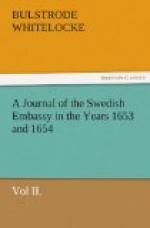[268] [Whitelocke, in his zeal to exhort the Heir-apparent to the service of God and the observance of the Lord’s Day, appears to have appreciated very imperfectly the extraordinary character and the political capacity of the Prince who paid him so signal a mark of deference. Yet in the romantic and chivalrous annals of the House of Vasa, scarcely any reign is more remarkable than that of the sovereign to whom Christina ceded the throne. In the course of the ensuing five years Charles Gustavus, at the head of a chosen band of Swedish veterans, conquered Prussia, and compelled the Great Elector to acknowledge himself to be a Swedish vassal; invaded Poland, and commenced the partition of that republic; allied himself to Rakoczy, to the terror of the House of Austria, and attacked Denmark with such success that he crossed the Little Belt on the ice and laid siege to Copenhagen, which was only saved by the mediation of the Maritime Powers. Such was the splendid career of Charles Gustavus between the period of his accession to the throne and the year 1660, when he died, not having completed his thirty-eighth year. More than any of his predecessors or of his successors on the Swedish throne, he may be said to have held the Empire of the North; and the favour here shown to Whitelocke indicates the importance attached by the Swedish Prince to secure at least the goodwill of Cromwell during the prosecution of these Extraordinary enterprises.]
[283] [Oxenstiern died about three months afterwards.]
[314] [It would be idle to speculate on the political motives which may have combined with other reasons to induce Christina of Sweden to conceive and execute this extraordinary design. Other sovereigns have abdicated from the lassitude of age or the burden of unpopularity, or the desire of ensuring the succession to their offspring; but the resignation of a Queen in her twenty-ninth year, surrounded by able ministers and a loyal people, and who had reigned with splendour and success, is an event without a parallel in history. The explanation of it is to be found in the eccentricity, the levity, the feverish curiosity, and the indomitable love of independence and singularity which are to be traced in every part of the Queen’s character. She was a woman of powerful but ill-regulated mind, capable at one time of sharing in the speculations of Descartes or of applauding the exhortations of Whitelocke,—at another, of bowing to the spiritual bondage of Rome, and even of committing the brutal murder of Monaldeschi. The character of Cromwell pleased her by its adventurous exploits and its arbitrary tendency, and her reception of the English Embassy was as much the result of personal predilection as of policy. Whitelocke amused her by his somewhat pedantic erudition, and flattered her vanity, but he seems scarcely to have divined the extraordinary variations of her character.]




